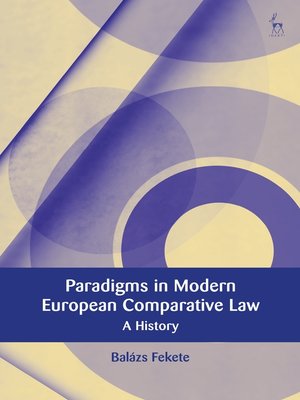Paradigms in Modern European Comparative Law
ebook ∣ A History · European Academy of Legal Theory Series
By Balázs Fekete

Sign up to save your library
With an OverDrive account, you can save your favorite libraries for at-a-glance information about availability. Find out more about OverDrive accounts.
Find this title in Libby, the library reading app by OverDrive.



Search for a digital library with this title
Title found at these libraries:
| Library Name | Distance |
|---|---|
| Loading... |
This book uses the philosophy of Thomas Kuhn to provide a new vision of the development of European comparative law that will challenge and inspire scholars in the field.
With the 'empathic' use of some ideas from Kuhn's theories on the history of science – paradigm, paradigm-shift, puzzle-solving research and incommensurability – the book rethinks the modern history of European comparative law from the late 19th century to the modern day.
It argues that three major paradigms determine modern comparative law:
- historical and comparative jurisprudence,
- droit comparé, and
- post-World War II comparative law.
It concludes that contemporary methodological trends are not signs of a paradigm-shift toward a postmodern and culturalist understanding of comparative law, but that the new approach spreads the idea of methodological plurality.
With the 'empathic' use of some ideas from Kuhn's theories on the history of science – paradigm, paradigm-shift, puzzle-solving research and incommensurability – the book rethinks the modern history of European comparative law from the late 19th century to the modern day.
It argues that three major paradigms determine modern comparative law:
- historical and comparative jurisprudence,
- droit comparé, and
- post-World War II comparative law.
It concludes that contemporary methodological trends are not signs of a paradigm-shift toward a postmodern and culturalist understanding of comparative law, but that the new approach spreads the idea of methodological plurality.







